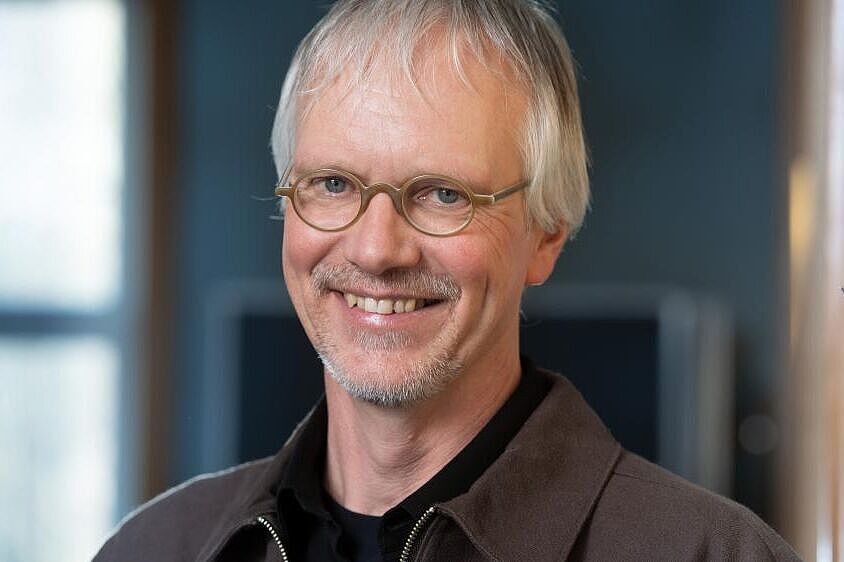The interview was conducted by Nadja Neumann & Katharina Bunk (IGB), and Anja Wirsing & Gesine Wiemer (FVB).
Neumann & Bunk: Luc De Meester, what made you want to become the director of IGB?
IGB is one of the most outstanding freshwater research institutes in Europe and worldwide. The institute has achieved a phenomenal development, and so this is an ideal moment in time to take on this position – IGB is highly recognized internationally, while there is still much scope for growth. The breadth in scope, so that we can study all aspects of entire ecosystems, combined with the long-term perspective sets us apart from typical settings in university laboratories, where research activities are often largely driven by the short-term perspectives offered by standard research projects. Here at IGB, we have the opportunity to really think long-term, and to combine the development of innovative research ideas with the translation of research outcomes to practice. I think this breadth and flexibility is wonderful, and extremely important for conducting relevant future-oriented research. The past twenty years at the university in Leuven, I led a quite large research group, conducted research, and contributed a lot to teaching. It was at times challenging to combine all this, but it was very rewarding and I very much enjoyed it. But as IGB’s director, I envisage being able to make a greater contribution to society, promoting a more sustainable management of our freshwater resources.
Wirsing & Wiemer: You have just started your new job and then the coronavirus crisis paralyzed everything. How has that affected the work at IGB?
I started enthusiastically at the beginning of the year and things moved forward very nicely. Then the coronavirus came. We were in emergency presence mode for approximately two months. We have a task force that virtually met every day at that time. It was a very intensive time – it is amazing that it took so much energy to responsibly reduce the amount of activities at the institute. Some crucial work was continued, such as care of the fish and invertebrate cultures, and also part of the long term monitoring schemes that only required probes to be read out in the field. We are now in the phase that research activities start up again. This is very important for our institute, as early summer is a key season for studying many ecological processes.
Neumann & Bunk: What challenges do you expect to face in your new position?
Managing change is not a trivial exercise. In my own research, I am fascinated by how communities and populations of organisms respond to environmental change or extreme events in nature. Resilience and the flexibility to respond to and take profit of change are very important. It is also important, however, that changes are not too drastic or extreme. I think this also holds for an institute such as IGB. It will be a balancing act to radiate a strong vision, while building on existing structures and keeping all staff on board. It is important to me that IGB is a community, that we jointly pursue the same goals. Being a Belgian, there is the additional challenge for me to familiarize myself with the German language and the German science landscape and research policy. But challenges…
Neumann & Bunk: ...can also be opportunities?
Yes, sure. In Germany, large investments are being made in sustainability research, which is a terrific opportunity. And I get the impression that the German society has a very positive attitude towards science and scientific insights, and that politicians in this country are open to research-based consultancy.
Wirsing & Wiemer: You have not only become director of IGB, but also a member of the Executive Board of FVB – one of the largest research institutions in Berlin. What does this mean for your work?
I am new to the German and Berlin system, so I do not know the ins and outs of how things work here. Being part of a bigger whole is one of the reasons why I felt attracted to become a director. With a joint administration like at FVB, there is an additional buffer that helps translating a vision into workable practice. This buffer comes in addition to the one provided by the administrative and managing staff at IGB, whose professionalism gives me much trust.
The Executive Board is very useful in the sense that I can learn from other directors. It also provides a perspective of the bigger picture, given the variety of institutes that make up the FVB. However, I also see some limitations, as the institutes differ very much in their research topics. As a result, there are not so many obvious opportunities for direct collaboration in research. Maybe I might be surprised on some of unexpected synergies in future, that is part of the fun. At this moment, I think it is especially the professional joint administration that is the key added value of FVB.
Wirsing & Wiemer: Berlin is an important location for German biodiversity research. What is of particular interest to you here?
I am very impressed by Berlin. This city must have one of the highest concentrations of researchers and scientific activities in the world – different universities and an amazing diversity of institutes and research groups that cover all aspects of scientific disciplines. This is also reflected in BR50, the new initiative of Berlin’s non-university research institutions. I attended the founding meeting and I am very inspired by this great network. BR50 will strengthen the positive atmosphere of collaboration in this city.
In case of the overarching research themes at IGB, there are hundreds of ecologists, evolutionary biologists, and biodiversity scientists in Berlin that enable many collaborations. In terms of networking, these conditions are ideal. In addition, the Berlin area offers a fantastic research environment, also in terms of the object of our work, the freshwater ecosystems and their biota.
Wirsing & Wiemer: IGB pursues important topics like biodiversity and climate change, which are very relevant for our society.
Yes, this is right. It is interesting to see that virologists are now being listened to because of the coronavirus. The experts’ opinions are really followed. This is the way it should be, because otherwise disasters might have happened. At the same time, the COVID-19 crisis also shows how many different aspects of life and human impact are linked, so that a broad perspective and scientific underpinning is needed. Interestingly, and sadly, a similar careful attention to scientific insights is more difficult to achieve with other crises such as climate change or the biodiversity crisis. They are also very deep and have increasing devastating and irreversible effects. While quite drastic measures would also be needed to cope with these crises, it is more difficult to achieve these changes as the direct impact seems less “close” to people and so there is less sense of urgency. I hope that in one way or another the reset done for the COVID-19 crisis creates possibilities to also work on these other urgent challenges. IGB would be happy to help where possible with our expertise on freshwater systems.
Luc De Meester is coming from the University of Leuven (KU Leuven) in Belgium as a professor in ecology and evolutionary biology. He takes over as IGB director from Klement Tockner, who headed the institute from 2007 to 2016, before being appointed President of the Austrian Science Fund FWF. In the intervening period, Mark Gessner, head of the Department of Experimental Limnology at IGB, served as the interim director of IGB, and oversaw the institute’s successful evaluation.


